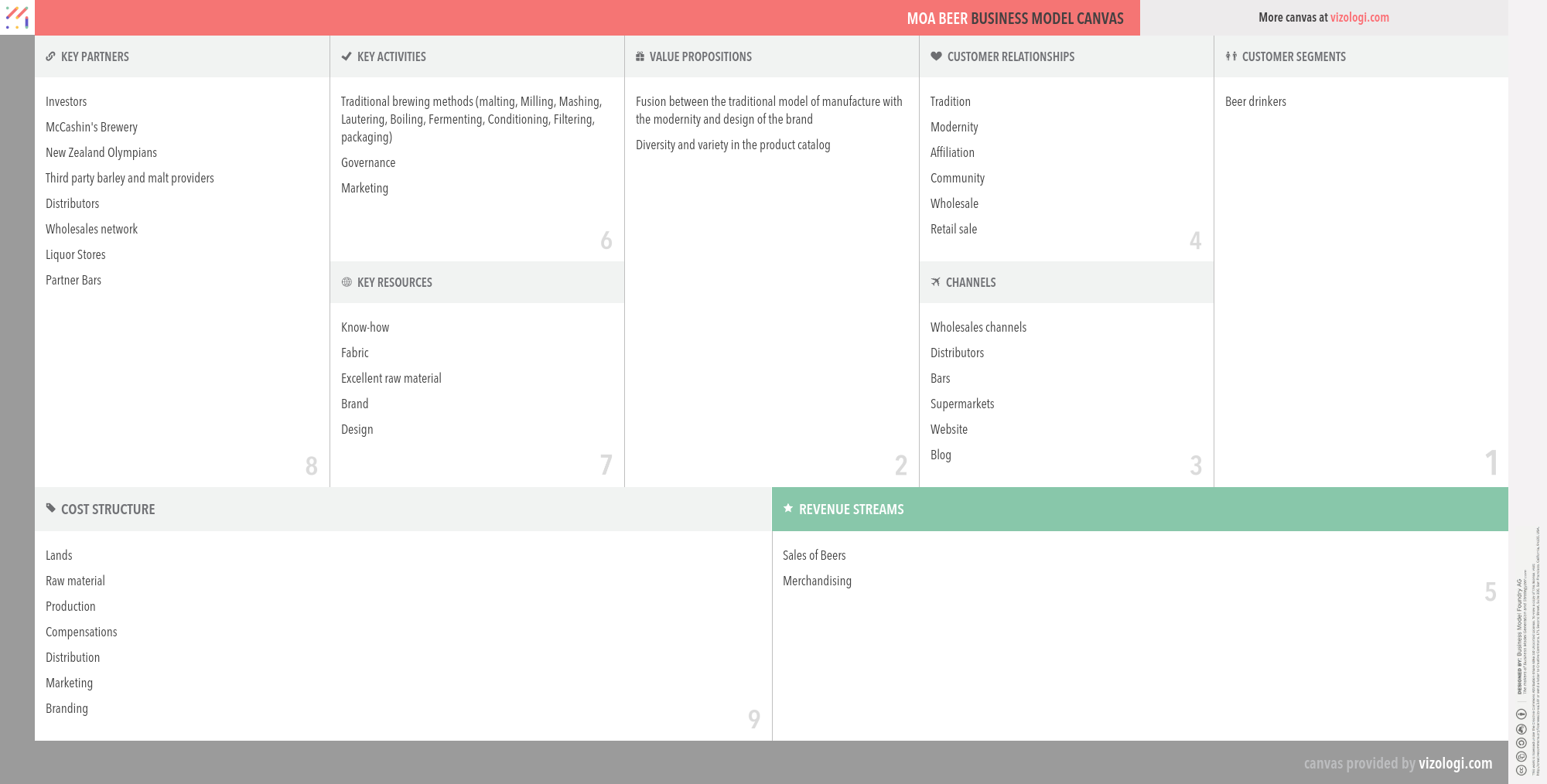Why Moa Beer's Business Model is so successful?
Get all the answers 
Moa Beer’s Company Overview
The Moa Brewing Company was founded in 2003 by Josh Scott, the son of renowned Marlborough winemaker Allan Scott, with a focus on brewing super premium handcrafted beers.
www.moabeer.comMoa Beer’s Customer Needs
Social impact:
Life changing: heirloom, affiliation/belonging
Emotional: design/aesthetics, badge value, attractiveness, fun/entertainment
Functional: quality, sensory appeal
Moa Beer’s Related Competitors
Moa Beer’s Business Operations
Acquiring non customers:
Acquiring non customers who traditionally did not seem to be the target of customer value proposition. Customer acquisition refers to gaining new consumers. Acquiring new customers involves persuading consumers to purchase a company’s products and/or services. Companies and organizations consider the cost of customer acquisition as an important measure in evaluating how much value customers bring to their businesses.
Customer relationship:
Due to the high cost of client acquisition, acquiring a sizable wallet share, economies of scale are crucial. Customer relationship management (CRM) is a technique for dealing with a business's interactions with current and prospective customers that aims to analyze data about customers' interactions with a company to improve business relationships with customers, with a particular emphasis on retention, and ultimately to drive sales growth.
eCommerce:
Electronic commerce, or e-commerce (alternatively spelled eCommerce), is a business model, or a subset of a larger business model, that allows a company or person to do business via an electronic network, usually the internet. As a result, customers gain from increased accessibility and convenience, while the business benefits from integrating sales and distribution with other internal operations. Electronic commerce is prevalent throughout all four main market segments: business to business, business to consumer, consumer to consumer, and consumer to business. Ecommerce may be used to sell almost any goods or service, from books and music to financial services and airline tickets.
Experience selling:
An experience in the sales model describes how a typical user perceives or comprehends a system's operation. A product or service's value is enhanced when an extra customer experience is included. Visual representations of experience models are abstract diagrams or metaphors derived from recognizable objects, actions, or systems. User interfaces use a range of experience models to help users rapidly comprehend what is occurring in the design, where they are, and what they may do next. For example, a software experience model may depict the connection between two applications and the relationship between an application and different navigation methods and other system or software components.
Fashion sense:
In any customized sense of style, the golden guideline is to buy garments that fit correctly. Nothing ruins an ensemble more than an ill-fitting jacket, shirt, or trouser, regardless of the dress code or the cost of the clothing. Personal Values Sharing as a Brand Identity A significant component of developing a company that fits your lifestyle is growing a business grounded in your beliefs.
Ingredient branding:
Ingredient branding is a kind of marketing in which a component or ingredient of a product or service is elevated to prominence and given its own identity. It is the process of developing a brand for an element or component of a product in order to communicate the ingredient's superior quality or performance. For example, everybody is aware of the now-famous Intel Inside and its subsequent success.
Make and distribute:
In this arrangement, the producer creates the product and distributes it to distributors, who oversee the goods' ongoing management in the market.
Regular replacement:
It includes items that must be replaced on a regular basis; the user cannot reuse them. Consumables are products utilized by people and companies and must be returned regularly due to wear and tear or depletion. Additionally, they may be described as components of a final product consumed or irreversibly changed throughout the production process, including semiconductor wafers and basic chemicals.
Selling of branded merchandise:
Merchandising, in the broadest definition, is any activity that helps sell goods to a retail customer. At the retail in-store level, merchandising refers to the range of goods offered for sale and the presentation of those products in a manner that piques consumers' attention and encourages them to make a purchase. Like the Mozilla Foundation and Wikimedia Foundation, specific open-source organizations offer branded goods such as t-shirts and coffee mugs. This may also be seen as an added service to the user community.
Social stakeholder:
Social responsibility will only be accurate if many managers embrace moral leadership rather than immoral leadership, organizational management, and business ethics that engage morals and values in corporate governance. In a nutshell, it addresses the concept of who or what really matters.
Recommended companies based on your search:

